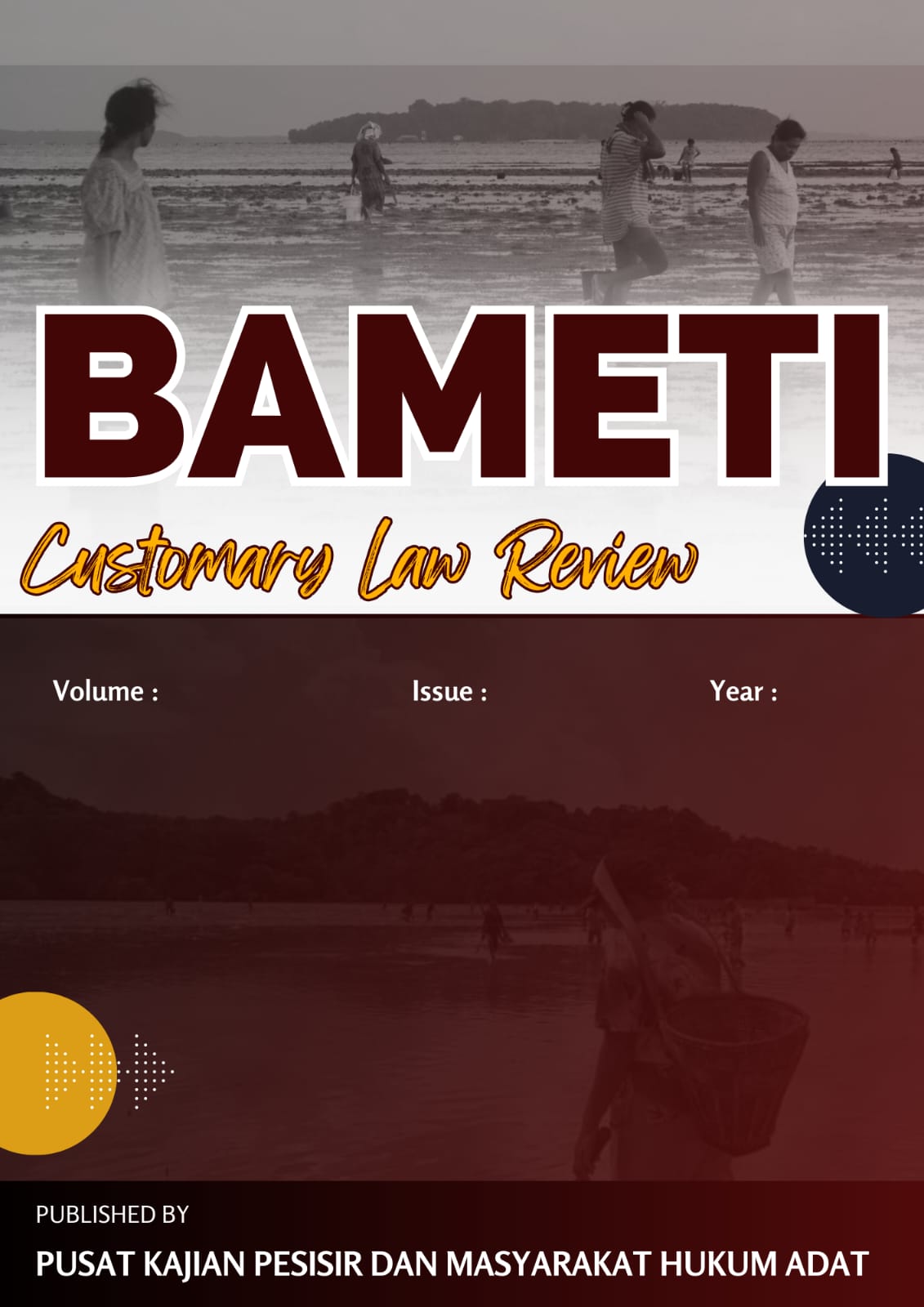Perlindungan Hukum Terhadap Tanah Adat Terlantar Yang Belum Ditetapkan Sebagai Tanah Hak Pengelolaan Masyarakat Hukum Adat
Abstract
Traditional land is land left by ancestors and is believed to have supernatural powers that are shared by a group of people. Abandoned land is land that is not cultivated or utilized. Based on article 8 letter a of Republic of Indonesia Government Regulation Number 20 of 2021 concerning controlling abandoned areas and land. Land with management rights that is excluded from the object of controlling abandoned land is land with management rights of indigenous communities. In this thesis, we examine customary land which is not the object of abandoned land, with the issues raised being the regulation of abandoned customary land in the Wermaktian sub-district, Rumsalut village and how to provide legal protection for abandoned customary land which has not been designated as the management right of customary law communities. This research uses a normative juridical method using a statutory approach, a conceptual approach and a case approach, as well as using primary, secondary and tertiary legal materials. The legal materials collected in the research are analyzed in a descriptive manner to draw conclusions. The results of this research show that regulations regarding abandoned customary land according to Law Number 5 of 1960 and Government Regulation of the Republic of Indonesia Number 20 of 2021 state that abandoned customary land in its regulation remains the management right of customary law communities. Then legal protection for abandoned customary land should be a form of protection for the dignity of customary law communities in accordance with the 1945 Constitution, article 18 b paragraph 2.
Downloads
References
A. P. Parlindungan, Berakhirnya Hak-Hak Atas Tanah Menurut Sistem UUPA, Jakarta: Mandar Maju, 2006.
A.P. Parlindungan, Berakhirnya Hak-Hak Atas Tanah Menurut Sistem UUPA. Jakarta: Mandar Maju, 2020.
Boedi Harsono. Sejarah Pembentukan UUPA, Isi dan Pelaksanaanya , Jilid I. Jakarta: Djambatan, 2005.
Hallauw Kosita Desy, Matuankotta Kristiana Jenny, Uktolseja Novyta, “Analisis Hukum Surat Pelapasan Hak Atas Tanah Adat di Kota Ambo.” Sasi, Jurnal Hukum Vol 26, No. 1 (2020): 111-118.
I Gede A.B. Wiranata, Hukum Adat Indonesia, perkembangannya dari masa ke masa. Bandung: Citra Aditya Bakti, 2005.
R. Roestandi Ardiwilaga. Hukum Agraria Indonesia. Masa Baru: Bandung-Djakarta, 1962.
Soerjono Soekanto dan Soleman B. Tanoko. Hukum Adat Indonesia. Jakarta: Raja Grafindo Persada, Cet. 4, 2001.
Soejono dan Abdurrahman. Prosedur Pendaftaran Tanah tentang Hak Milik, Hak Sewa Guna dan Hak Guna Bangunan. Jakarta: Rineka Cipta, 2008.
Soerjono Soekanto dan Sri Mamudji, Penelitian Hukum Normatif, Suatu Tinjauan Singkat. Jakarta: Rajawali Press, 1990.
Supriadi. Hukum Agraria. Jakarta: Sinar Grafika, 2012.
Suhariningsih Tanah Terlantar, Asas dan Pembaharuan Konsep Menuju Penertiban. Jakarta: Prestasi Pustaka, 2009.
Suhariningsih, Tanah Terlantar, Jakarta: Prestasi Pustaka Raya, 2009.
https://www.hukumonline.com/berita/a/perlindungan-hukum-contoh--dan-cara
http://e-journal.uajy.ac.id/25330/3/12%2052%2001894_2.pdf
https://business-law.binus.ac.id/2017/09/30/masalah-tanah-terlantar-dalam
Copyright (c) 2024 Naomi Anastaria Basar, Jenny Kristiana Matuankotta, Novyta Kristiana Uktolseja (Author)

This work is licensed under a Creative Commons Attribution-NonCommercial 4.0 International License.
Authors who publish their manuscripts in this Journal agree to the following conditions:
- The copyright in each article belongs to the author, as well as the right to patent.
- Authors are able to enter into separate, additional contractual arrangements for the non-exclusive distribution of the journal's published version of the work (e.g., post it to an institutional repository or publish it in a book), with an acknowledgment of its initial publication in this journal.
- Authors are permitted and encouraged to post their work online (e.g., in institutional repositories or on their website) prior to and during the submission process, as it can lead to productive exchanges, as well as earlier and greater citation of published work.
- Authors have the right to self-archiving of the article (Author Self-Archiving Policy)













